Zero Covid: 42 times fewer deaths and five times less contraction in GDP
Paris, April 2, 2021: The Zero Covid strategy is by far the most effective way to fight the current pandemic. In an original analysis released today, the Institut économique Molinari compares the G10 countries to three OECD countries that have implemented an elimination strategy (Australia and New Zealand) or something similar (South Korea).
After a Covid-19 fight lasting more than 12 months, the data show the value of the elimination strategy and contradict the idea, widespread in France, that it was necessary to choose between protecting the economy and protecting public health on the grounds that these two goals were in conflict. At this stage, experience shows the elimination strategy (Zero Covid) to be more effective in both health and economic terms than the mitigation strategy applied in many countries.
THE REPORT SHOWS FRANCE TO BE MORE AFFECTED
- France is more affected by the epidemic than the OECD countries that have chosen the Zero Covid strategy or something similar, constituting a representative sample of 82 million people in developed countries.
- Deaths per million people are 42 times higher in France, indicating 63,000 preventable deaths by the end of 2020 or 86,000 as of March 20, 2021.
- Last year, GDP declined five times more in France, representing lost earnings of €2,200 per French citizen.
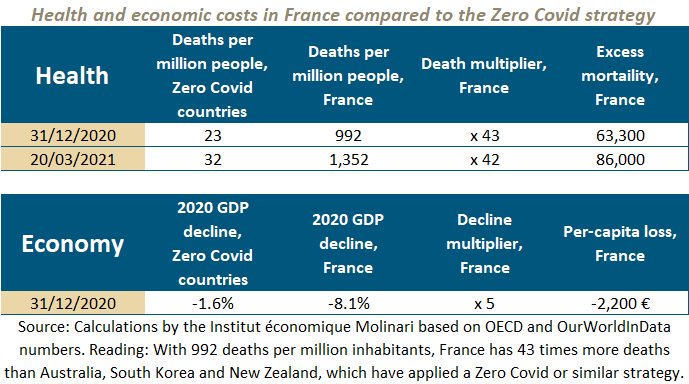
THE ZERO COVID STRATEGY BENEFITS THE ECONOMY
- Short-term positive effects: Countries pursuing a Zero Covid strategy experienced a less severe economic decline in the second quarter of 2020 than the countries that allowed the virus to spread to such an extent that their health systems were saturated (-4.5% versus -11.7%).
- The Zero Covid strategy is showing lasting positive effects: In the fourth quarter of 2020, the countries applying this strategy had almost returned to normal economic activity. Their GDP was down only slightly (-1.2%) compared to 2019. Meanwhile, the decline in GDP was greater (-3.3%) in countries that had not eradicated the virus.
ZERO COVID: MOBILITY THAT STANDS UP BETTER OVER TIME
- Mobility data from Google show that “workplace” traffic in the second quarter of 2020 fell by less in the countries applying the Zero Covid strategy (-14 % compared to -36 %). These data also show that Zero Covid countries retained a significant advantage with a 15% reduction in mobility in January-February 2021 compared to 28% in countries not applying a Zero Covid strategy.
- Google data show that traffic in “cafés, restaurants, hotels, non-food businesses and leisure and cultural activities in general” was down by 14% in January and February 2021, compared to 2020, in the countries applying the Zero Covid strategy. This is a much smaller decline than in the countries applying a mitigation strategy (down 35%).
ZERO COVID HELPS CONTROL UNCERTAINTY
Cross-referencing of quarterly economic and health data confirms the superiority of the elimination strategy in terms of anticipation. People in those countries benefit from a level of visibility enabling them to project their societies and economies into the future.
In contrast, the course taken by the G10 countries has produced fluctuations, with the epidemic rebounding in the fourth quarter of 2020 everywhere except Japan, which is moving closer to Zero Covid. The mitigation strategy is causing them to seesaw, making it difficult to project into the future and thereby penalising societies and economies. This is especially problematic for businesses that depend on significant social interaction, which have been closed for months, as representatives of the hotel, restaurant, culture and recreation sectors have stated repeatedly.
In February 2021, Google searches for the word “Restaurant” were 64% lower than in February 2019. This decline was five times greater than in the Zero Covid countries, where restaurants are open and searches are down only 13% from February 2019.
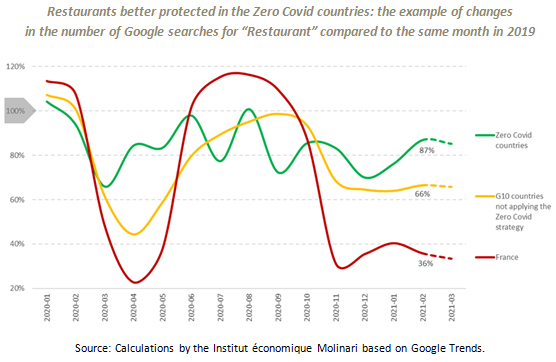
Participation in economic and social life is a function of people’s confidence in being able to take part without running the risk of falling ill, contaminating others or seeing health services overwhelmed.
It is not only government-imposed restrictions that reduce movement. Voluntary decisions by individuals to cut back on social life in the face of a fast-spreading virus also play a key role. The Swedish example shows the importance of this phenomenon since, even without a lockdown, the decline in mobility was significant. This explains why Sweden’s economic contraction was close to the levels observed in Scandinavian countries that went into formal lockdown. Where the elimination strategy is implemented, the end of the tunnel becomes predictable, and it is then possible to make reliable long-term plans, resulting in stronger economic performance and lower mortality.
RECOMMENDATIONS
- Invite an open dialog about the adoption of a Zero Covid strategy to include experts from countries that have implemented it thus far.
- Rally the diplomatic network and parliamentarians representing French citizens abroad to broaden feedback on Zero Covid strategies.
- Assign mandates to assess the advantages and disadvantages of strategies for fighting SARS-CoV2 by calling, in particular, upon French public organisations that analyse public policy (Conseil d’analyse économique, CESE, France stratégie, etc.)
- Organise feedback from French communities that have implemented the Zero Covid approach (New Caledonia, etc.).
- Support pilot projects in parts of France when local executives are receptive to the advantages of the Zero Covid strategy.
- Bring the Zero Covid strategy into analysis of risks related to the health crisis at both the French and European levels. The European Union can be a major player in the strategy’s coordination.
QUOTES
Cécile Philippe, President, Institut économique Molinari, and co-author:
“Analysis of data on mortality, economic growth and mobility shows that health, economic and social interests are aligned.
“The countries that kept the spread of the virus to a minimum with a Zero Covid strategy have fared the best. They have recorded 42 times fewer deaths than in France, and their economies have not been hit as hard, with GDP falling five times less. Their initial lockdowns have proven to be a highly lucrative investment. For months, their people have not been hobbled nearly as much by restrictions on movement, whether voluntary or compulsory. These countries are in a position to implement gradual and well-organized vaccination campaigns. They are keeping their schools open without compromising the health of children or their families. They are holding back the number of people showing long-term symptoms (long Covid) and containing the spread of variants due to an absence of contamination.”
Nicolas Marques, Director, Institut économique Molinari, and co-author:
“The false dichotomy between health and economic interests has not helped in making the right public policy choices. Contrary to what has been said, health and economic issues are aligned in this pandemic.
“The pandemic has been especially deadly in North America, South America and Europe. Meanwhile, its impact has not been as great in Asia, Africa and Oceania, with far lower death rates and much better economic performance.
“Among rich countries, the discrepancies arise from different strategic choices. Most G10 countries chose a mitigation approach, failing to capitalise on the very significant effort made by their people during the lockdown in the second quarter of 2020. Australia, New Zealand and South Korea, joined by Japan, instead regarded lasting elimination of the virus as a key investment for their economies and societies. The data show that this Zero Covid strategy is a double winner in the long run, drastically reducing mortality while protecting economies far better.”
RESOURCES, GRAPHS AND FIGURES
The report “The Zero Covid strategy protects people and economies more effectively” is available on IEM’s website : Download the study in English
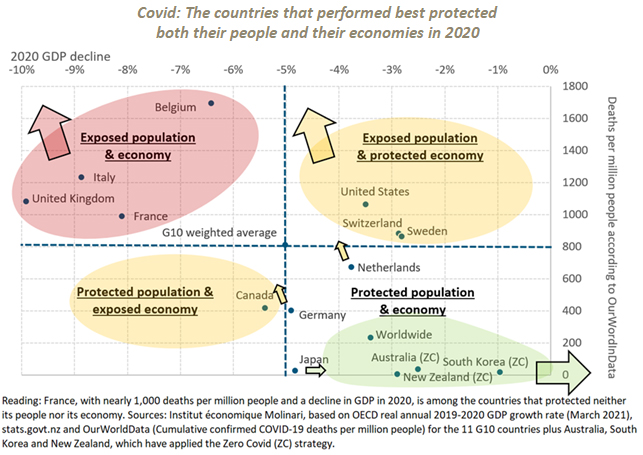
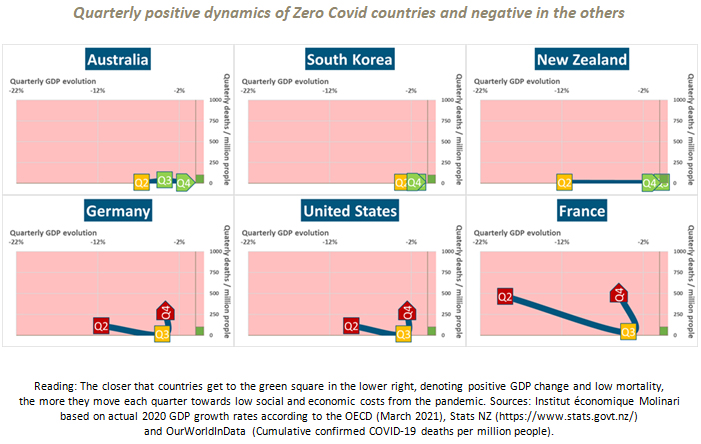
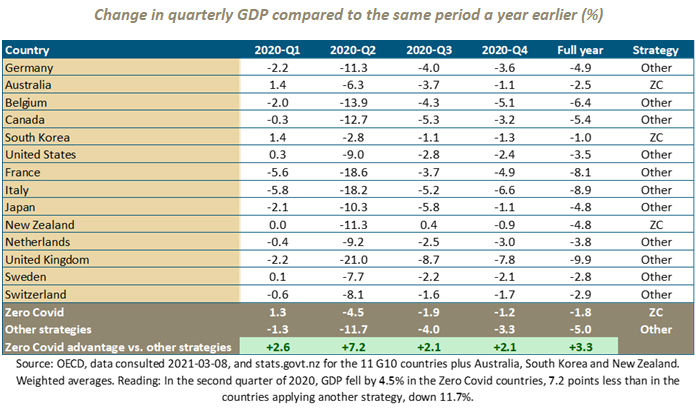
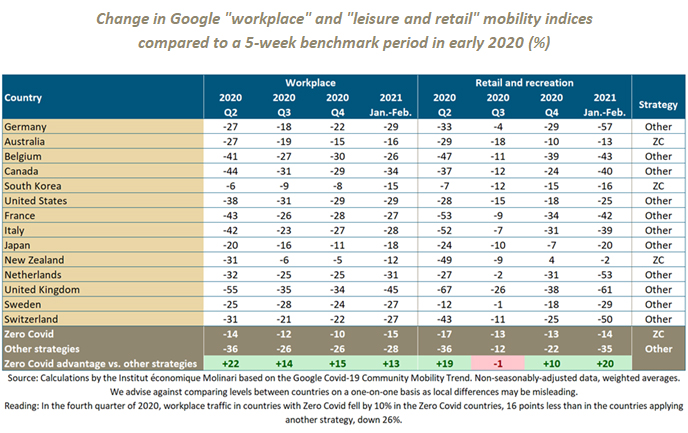
FOR INFORMATION OR INTERVIEWS, CONTACT:
Cécile Philippe, President, Institut économique Molinari
cecile@institutmolinari.org
Nicolas Marques, Managing Director, Institut économique Molinari
(Paris, in French)
nicolas@institutmolinari.org
ABOUT THE AUTHORS AND THE IEM
The Institut économique Molinari (IEM) is a research and education organisation with the mission of promoting individual freedom and responsibility. The Institute aims to facilitate change by spurring debate around preconceived ideas that engender the status quo. It seeks to stimulate the emergence of new consensus positions by offering an economic analysis of public policy, demonstrating the value of dialogue and indicating the benefits of more lenient regulation and taxation. The IEM is a non-profit organisation financed by voluntary contributions from its members: individuals, foundations and businesses. Putting intellectual independence foremost, it accepts no public subsidies.




